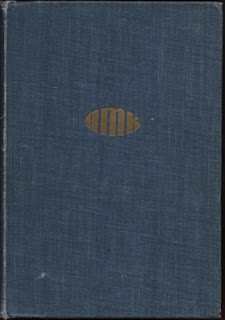Not one week into 2020, I met a physician friend for dinner at Sidedoor in Ottawa's ByWard Market. Over too many drinks, he told me of his concerns about a virus sweeping through China's Hubei province. I'd seen a bit about it on the CBC and had noticed headlines in the Globe & Mail, but didn't take the threat nearly so seriously. Again, too many drinks. Eleven months later, we've just spent our first Christmas apart from our daughter. Parents and a grandparent, who live well within driving distance, were kept at bay. To think that in last year's 'Best Reads' I described 2019 as "a very strange year."
Here's to better times.
I reviewed twenty-one titles here and in the pages of Canadian Notes & Queries this year. Tradition dictates that I suggest three most deserving of a return to print. Easily done:
The New Front LineHubert Evans
Toronto: Macmillan, 1927
The first novel by a writer remembered – when he is remembered – for Mist on the River (1954). Here Evans draws upon his own experiences as a returning Great War veteran who rejects the city and its commerce for a healthier life in rural British Columbia. The love of a good woman figures.
West Coast rural noir written by a transplanted Manitoban, this tale of two teens confronting a drug cartel brought back such memories. Nothing to do with battling crooks, you understand, rather being young. I was caught up in Joe and Devvy's adventure and romance. I'm betting you will be, too.
Blantyre—Alien
Alan Sullivan
London J.M. Dent, 1914
The first book I read this year, and the first of the author's thirty-something novels, Blantyre—Alien has grown on me. A story as strange as its title, it concerns a medical doctor, his wife, and their disintegrating marriage. I found interest in its depiction of Toronto the Good
Two books I reviewed this year are currently in print:
The lone book revisited this year, I first read Not for Every Eye, Glen Shortliffe's translation of Gerard Bessette's Le libraire (1960), as a very young man in in the summer of '85. I found I liked it more in middle age because my more seasoned self better understood narrator and protagonist Hervé Jodoin. An essential text for anyone interested in censorship as depicted in fiction or the dark days of Duplessis' Quebec. Not For Every Eye is available through Exile Editions.
Does Armand Durand count? I read Mrs Leprohon's 1868 novel in a 19th-century French translation by J.-A. Genaud. The original is in print as part of the Borealis Press Early Canadian Women's Series. My French is so very weak that it took months for me to get through the novel. I wonder whether spending all that time with the Durand family contributed in some way to my concern for their trials.
Two of the three novels selected last year as "most deserving of a return to print" did just that! I'm proud to say that I played a hand in both:
I Am Not GuiltyFrances Shelley Wees
Montreal, Véhicule, 2020
Following The Keys of My Prison, this is the second Wees novel I've helped revive. I'm torn as to which I prefer. In this 1954 tale of domestic suspense, a widow relocates to post-war suburban Toronto in an attempt to solve her husband's murder. Martinis and harried businessmen figure. Patti Abbott was good enough to provide the introduction.
Phyllis Brett Young
Montreal, Véhicule, 2020
First published in 1962 under the nom de plume Kendal Young, The Ravine was Phyllis Brett Young's only thriller. Remarkably, it remains the only one of her novels to have been adapted to the screen. Don't bother with the film, read the book. The introduction is by Amy Lavender Harris.
Praise this year goes to Mary Chapman and the ever-expanding Winnifred Eaton Archive. This online site provides a remarkable wealth of material concerning the groundbreaking Asian-Canadian author of Marion and "Cattle", amongst other novels. Of late, I've become increasingly interested in Eaton's Hollywood years. The Archive somehow satisfies while fuelling my desire for more. Do visit!
And now, the resolutions:
I've got three book projects on the go, but will be doubling down on telling the awful story of Maria Monk. As a result, fewer titles will be reviewed here next year. I'll be filling the gaps by reviving 'The Dustiest Bookcase.' Seasoned readers may remember it as a series of short pieces on books I've always meant to review (but haven't).
Oh... and as always, I resolve to keep kicking against the pricks.
Wishing everyone a Happier and Healthier New Year! Bonne année!
The Year's Best Books in Review - A.D. 2016
The Year's Best Books in Review - A.D. 2015
The Christmas Offering of Books - 1914 and 2014
A Last Minute Gift Slogan, "Give Books" (2013)
Grumbles About Gumble & Praise for Stark House (2012)
The Highest Compliments of the Season (2011)
A 75-Year-Old Virgin and Others I Acquired (2010)
Books are Best (2009)






























